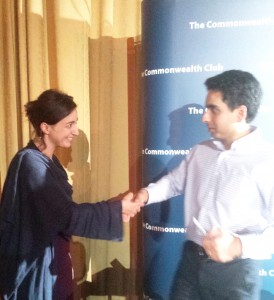by Sarah Thrift on March 16, 2014
Sal Khan is quite a wonderful person – I am in awe.
He is pioneering enormous change through the Khan Academy with the beautiful mission of a free, world-class education for anyone, anywhere.
“The One World Schoolhouse: Education Reimagined”

A few key tenets of Sal Khan’s beliefs and approach that really spoke to me from his book :
- A pedagogy where the learner is self-directed, in the center of the learning paradigm, and teachers act as mentors and guides rather than directors of learning
- Students can be inherently motivated when the conditions of learning are right, where they can work at their own pace, experience success, and are not grouped by ability or age.
- Students progress at their own pace, only moving ahead when they have mastered the concepts.
- Two things as the centerpieces of a student’s appraisal: a running multi-year narrative not only of what a student has learned but how she learned it, and a portfolio a student’s creative work.
Sal Khan’s work is changing the world. I love it that he is enabling students to see the beauty in the math, the joy of learning.
**********
Update
**********
I was delighted to get to meet Sal Khan as part of my own work in education. What an inspiring man – particularly striking was his humility. I was also struck by his comments that when he set up the Khan Academy he considered whether it should be a for-profit organization or a not-for-profit. He wanted to be able to have something that lasted, that would leave a legacy. A commercial organization would always be vulnerable to take-over and to mission sway due to the need to make profit.

So glad that Khan has had the vision and altruism to make the Khan Academy a not-for-profit organization. Thanks Sal!
by Sarah Thrift on March 3, 2014
Welcome to the final part of our 6 part series.
This week we are looking at the importance of evolving your product/service to stay competitive and meet customer needs.

However great your product/service is today, that is no guarantee of future success.
Take Kodak — who had some of the earliest digital photography technology — and who ended up filing for bankruptcy. Or Nokia, who have missed the smart phone wave despite having the technology early than others such as Apple.
What this means is the approach to learning and refining your product/service that we talked about last week, needs to become a way of working i.e. creating a mindset of continually learning about the product/service so that can evolve in line with customers needs – or be replaced by something better.
Instilling a Culture of Learning
What we are really talking about here is creating a culture of learning and innovation where curiosity is valued and genuine feedback desired.
Key feature of such a culture include:
- Leadership team have a mindset of curiosity and wanting to learn, if when what they learn is not what they want to hear.
- Everybody, regardless of seniority is encouraged to speak-up. All input is welcome.
- A desire for the truth trumps and pride/ego and/or attachment to a product/service – nothing is a “sacred cow”.
- People listen for what is really said/ not said rather than listening to be right or for what want to hear.
- There is follow-up to people’s suggestions, for example, if an employee’s idea is not being taken forward it is often important to tell them that so that even if they don’t agree or are disappointed, they know that their idea was heard.
Changing the Culture
Successful culture change creates a tipping point: there are approximately 5-10% of the organization’s leaders whose behavior (once shifted) will create the entire shift. This means that you want to identify leaders who can embody the cultural change in their own actions and through this inspire similar behaviors in others.
On a very practical level, organizations who excel at having an innovative, often a number of the following are also implemented:
Forums designed for providing and sharing feedback on products/services.
Competitions (internally and with customers and suppliers) for feedback and ideas.
.
Recognition and awards for feedback and ideas.
If you truly have such a culture, you will get warning and feedback when your product/service no longer meets needs, or becomes less relevant or where a competitor is offering a better product/services and you have the information you need to make the best choices in the long-term interest of your organization.
Good luck on this journey! I have very much enjoyed these last 6 weeks working on Ideas that Produce Results and look forward to hearing your continued feedback,
Warmly,
Sarah



